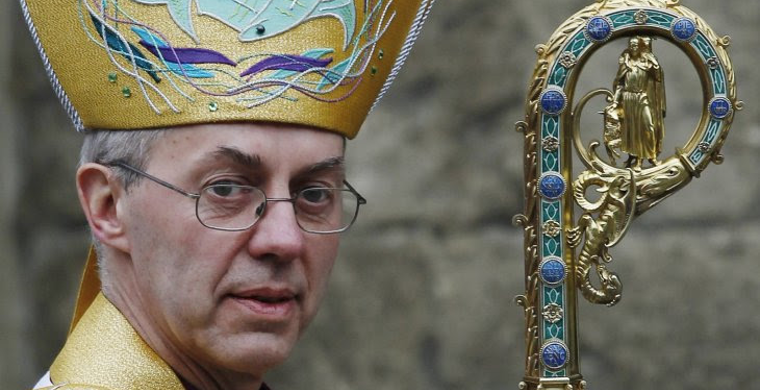Archbishop of Canterbury Justin Welby Interview: 'I Have No Right to Be Here'
By Robert Chalmers
NEWSWEEK
http://europe.newsweek.com/
July 28, 2015
There are three services a day here at Lambeth Palace, the Archbishop of Canterbury tells me. "Morning Prayer, at 8.40, Holy Communion at 12.30 and another in the evening, at 5.30."
Watching the news before I set off for his grand office, I tell him, I'd seen footage relating to the 500 children blown to pieces in Gaza last year, images from the Ukraine and a report on child abuse. It seemed legitimate to ask quite how effective the Archbishop believes the weapon of prayer to be.
"That's the question one always returns to. Prayer isn't a means of making things happen. If God exists, God is worth talking to and listening to. That's the simple way of putting it."
Welby has a reputation as a guy who enjoys a good laugh and discourages formality. His manner when I meet him is affable but circumspect. This is a man who once observed that he didn't want the top job and was "one of the thicker bishops" in the Church of England.
"I can spot an old Etonian a mile off ," I venture, "and your defining characteristic is precisely that kind of phoney diffidence."
"You should meet more bishops. There are very clever folk around."
Does he believe he was chosen by God?
"The church recognised that I was the appropriate person to be the next Archbishop."
"Meaning God, speaking via the church?"
"Yes," says Welby. "Probably. I hope so."
Archbishop Welby, 59, served an unusual apprenticeship, having worked for oil corporations including the French company ELF, in its infamous period of malpractice (illegality of which the future cleric was wholly unaware).
He has distinguished himself by his extreme bravery, notably in Africa, his empathy for the dispossessed (which prompted his recruiting credit unions to the so-called "War on Wonga") and his criticism of corruption in the City. He is no slave to tradition.
"Nobody I know calls me Your Grace. Normally it's Justin." And yet, he acknowledges, he is undeniably part of the British Establishment. I'd spent the previous day discussing Jack the Ripper: a case in which the widely perceived readiness of authority figures to shield an individual from the law has some resonance today.
"Jack the Ripper," Welby replies; "that was the 19th century."
"Some suspect there is still a hierarchy above the law. I was thinking of Jimmy Savile."
"If there is, I don't know about it. As regards child abuse, there is rigorous transparency."
Welby once remarked that leading Anglicans was like taking a cat for a walk. Given the church's divisions, I suggest, another analogy would be that of a man wearing roller skates, holding two leads: one restraining a panther, one a wildebeest.
The challenge, he believes, "is to acknowledge diversity and continue -- as Christ instructed -- to love one another".
For all his qualities, Welby isn't universally adored. I read out an email I'd received from a well-known writer the previous day.
"What kind of country appoints a middle-ranking oil man to the highest spiritual office in the land? Somebody who [associates with] corrupt bankers like [a financier, "X" who, Newsweek's lawyers inform me, would more prudently be described as a model of ethical perfection] or living in a palace when he represents a gospel of poverty?"
"That anger," Welby says, "has always been there. I spent 10 years in parishes on a very low income."
"Having once lived it up in your flat near the Louvre?"
"Absolutely."
"Is there a case for selling off this grandeur?"
"Yes," replies Welby. "But what would we do with the money? People say, 'Give the church's money away'. We do," he adds, with some warmth. "We have [a thud as he strikes the table] 8,000 clergy working [thud] for communities [thud] day [thud] in and day out. We have [thud] chaplains in every regiment, [thud] every prison, [thud] every hospital. [Thud] Working their guts out. We pay them. That's giving money away. And calling [financier X] corrupt: I've seen no evidence of that."
"Imagine we voted for our state religion -- or none -- every five years. Would you be here?"
"I've no idea. It's an interesting point. In the sense that I have no right to be here."
"I'm not saying that."
"I am. I have no right to be here. [I am here] to proclaim the good work of Jesus Christ. There isn't a day goes by that I don't recognise the enormous gift of living in a place like this."
As we say goodbye, I tell Welby that I pondered giving him a masonic handshake, on the grounds that he must have received enough of them to recognise one. This impertinence is greeted with an old-fashioned look. I sense I'm unlikely to be asked back here for lunch.
That said, if an elected state church and leader ever transpires, this courageous, humane and thoughtful cleric would be my choice.
END














